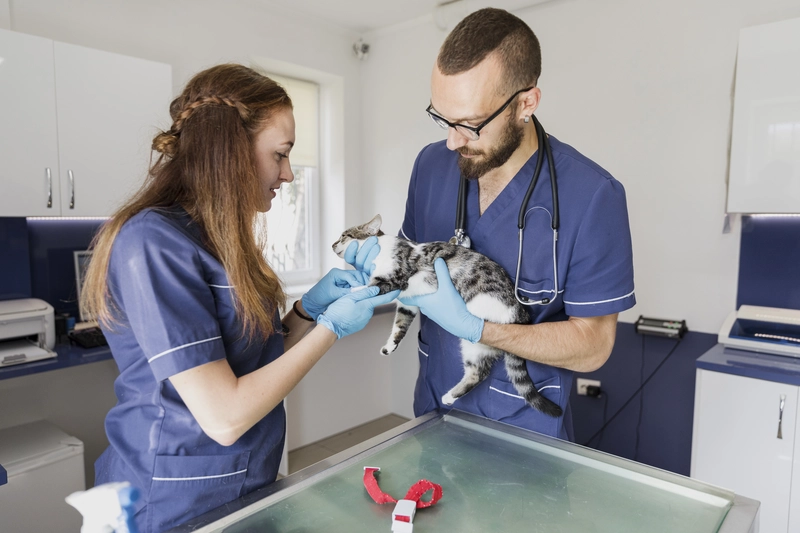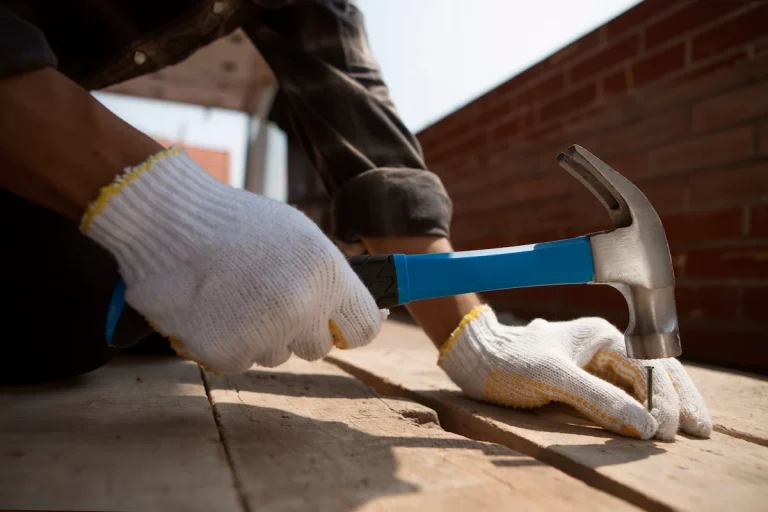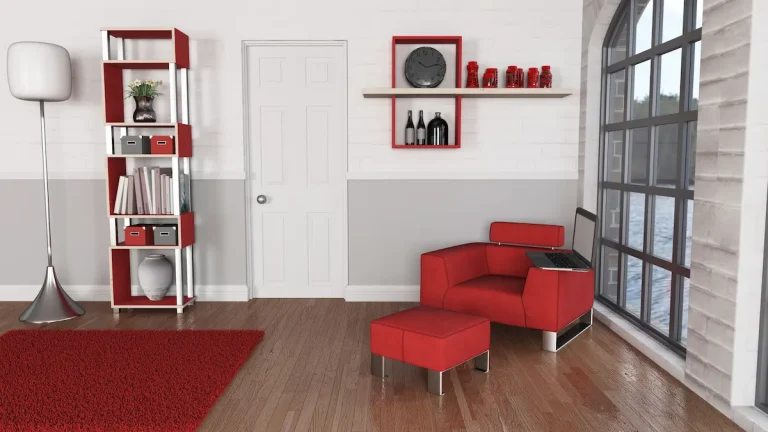Choosing the appropriate flooring for veterinary clinics is essential for establishing a safe, functional, and welcoming environment. Given the specific flooring requirements such as non-slip surfaces, easy maintenance, and durability, it is important to understand which flooring options are most suitable for this particular setting.
This article examines various types of flooring appropriate for veterinary practices, highlighting leading options such as vinyl, rubber, and epoxy resin, along with their respective benefits. It will also address important considerations to remember during the selection and flooring installation process. Continue reading to learn how the right flooring can enhance your clinic’s operations and overall atmosphere.
The Importance of Choosing the Best Flooring Important for Veterinary Clinics
Choosing the best flooring for veterinary hospital is crucial because it directly impacts not only the aesthetic appeal and functionality of the space but also the overall welfare of the animals, staff, and clients. Flooring specialists help ensure the selection process meets these needs.
Veterinary practices face unique challenges, including high-traffic areas, the need for easy maintenance, and safety concerns, all of which make the selection of durable and hygienic flooring solutions essential. Flooring specialists play a crucial role in addressing these unique challenges.
By understanding the various flooring options available, clinics can ensure a safe environment that supports animal care while also meeting the specific requirements of the veterinary industry. This comprehensive approach to flooring selection can enhance the operational efficiency of veterinary clinics and contribute to better outcomes for animal welfare.
The Specific Needs of Veterinary Clinics
Veterinary clinics have specific needs for flooring that cater to the unique requirements of animal care and safety.
Understanding that these facilities demand solutions tailored to their environments is crucial. The flooring options must not only withstand the rigorous demands of daily animal care but also provide a safe space for furry patients and their human counterparts. From slip resistance in busy examination rooms to the necessity for surfaces that can endure heavy cleaning, every aspect is significant in ensuring flooring safety.
Durability ensures that the flooring can withstand high foot traffic and the occasional accident. Ease of maintenance is vital because any delays in cleaning can lead to health risks. Incorporating materials with antimicrobial properties and chemical resistance is also critical for minimising the risk of infection.
All these factors contribute to a safe, clean, and functional environment that fosters effective animal care and treatment, supporting animal welfare.
The Suitable Types of Flooring for Veterinary Clinics
When considering types of flooring for veterinary clinics, it is essential to evaluate various flooring options that meet both functional and aesthetic requirements. The right veterinary flooring enhances the clinic’s appearance and provides safe and hygienic conditions for animals and staff, ensuring flooring performance.
Key flooring features such as slip resistance, durability, and ease of cleaning must be prioritised to address the high demands of commercial environments and veterinary flooring systems. From seamless flooring to options with customisable finishes, each type provides unique benefits tailored to veterinary practices, ensuring that both animals and personnel are safe and comfortable in high-traffic areas. Flooring customisation allows for tailored solutions.
1. Non-Slip Flooring
Non-slip flooring is a crucial choice for veterinary clinics, addressing the primary concern of safety for both animals and staff. This type of slip-resistant flooring is designed to prevent slips and falls, especially in areas prone to moisture and spills, making it essential for environments where animal care takes place.
By utilising durable and waterproof materials, non-slip flooring ensures a safe environment that caters to the unique challenges faced in veterinary practices. Its design can be tailored to enhance the overall aesthetic appeal of the clinic while delivering excellent flooring performance in high-traffic areas.
When selecting non-slip flooring, several options can be considered, each offering specific advantages:
- Vinyl Flooring: This water-resistant material comes with various textures to enhance grip, making it a popular choice.
- Rubber Flooring: Known for its durability and shock absorption, it is also easy to maintain, ensuring longevity under heavy use.
- Tile Flooring: Available in anti-slip finishes, tiles are a great option for those looking for versatility in design.
Ultimately, the investment in non-slip flooring transcends aesthetics, it significantly reduces the risk of accidents, promoting a safer working environment and a positive experience for all visitors.
2. Easy to Clean Flooring
Easy-to-clean flooring is vital for veterinary clinics as it significantly reduces maintenance time and promotes a hygienic environment. Given the nature of animal care, clinics need flooring solutions that can withstand spills, stains, and dirt, ensuring that the space remains clean and safe for both animals and clients. Non-porous materials enhance this safety.
In this context, hygienic flooring options such as vinyl, linoleum, and laminate emerge as exceptional choices, delivering both style and functionality, while meeting flooring design requirements.
- Durability: These materials are designed to resist wear and tear, making them ideal for high-traffic areas.
- Easy Maintenance: Smooth surfaces facilitate quick cleaning and disinfecting, crucial for infection control.
- Non-Porous Materials: Preventing absorption of fluids, these floors inhibit the growth of harmful bacteria and allergens, ensuring a healthy atmosphere.
Utilising non-porous flooring materials can further enhance cleanliness by preventing bacteria and allergens from accumulating, making it an ideal choice for veterinary flooring. This also boosts the longevity of flooring installations. The efficiency of easy-to-clean flooring directly impacts the overall operational effectiveness of veterinary practices and contributes to better animal welfare.
3. Durable Flooring
Durable flooring is essential for veterinary clinics as it must endure the wear and tear of high-traffic areas while providing a safe and functional space for animal care. This type of flooring is designed to be impact-resistant, ensuring that it can withstand the daily challenges of a busy veterinary practice.
Investing in durable flooring not only extends the longevity of the flooring systems in place but also enhances the overall functionality of the clinic by minimising the need for frequent replacements or repairs. This thoughtful investment ultimately supports the financial and operational efficiency of veterinary practices, providing a cost-effective solution.
Properly selected flooring solutions, such as rubber and polyvinyl chloride (PVC), offer incredible durability and impact resistance that aligns with the demanding environment of a veterinary clinic.
These durable materials resist scratches, stains, and chemicals, making them ideal for animal care settings. They provide a slip-resistant surface, ensuring safety for both pets and staff during hectic moments.
- Rubber flooring is easy to clean and maintain, which is crucial for hygiene and flooring longevity.
- PVC tiles, renowned for their resilience, offer a variety of patterns and colours, enhancing the aesthetic appeal.
Ultimately, choosing long-lasting flooring types not only secures a better working environment but also reflects the commitment to quality care that veterinary practices strive to provide.
4. Noise-Reducing Flooring
Noise-reducing flooring is an often-overlooked aspect of veterinary clinic design, yet it plays a vital role in minimising animal stress and creating a calm environment, enhancing the flooring safety and overall patient experience.
In settings where every sound can trigger anxiety in pets, the importance of noise-reducing flooring cannot be overstated. This is particularly important in environments like catteries and dog grooming salons.
By selecting materials engineered specifically for their acoustic properties, veterinary clinics can effectively dampen disruptive sounds, making a significant difference in areas such as surgical suites, reception areas, and waiting rooms. This results in a more serene atmosphere, which is crucial for the recovery and comfort of animals, especially those already experiencing stress due to medical procedures in veterinary clinics.
Calmer surroundings benefit the veterinary staff by allowing them to focus better on their tasks without the distraction of excessive noise, ultimately enhancing productivity and operational efficiency.
Such thoughtful renovations also go a long way in fostering a positive relationship between veterinary clinics and their clients, creating an environment where both human and animal residents feel more at ease, reflecting the commitment to quality care.
The Best Flooring for Veterinary Clinics
Regarding the best flooring options for veterinary clinics, several materials stand out due to their unique benefits and suitability for animal care environments. Consulting with flooring specialists can enhance the selection process.
1. Vinyl Flooring A Versatile Option for Animal Flooring
Vinyl flooring is a top choice for veterinary clinics due to its easy maintenance, waterproof properties, and durable materials. This flooring option is resistant to spills and stains, making it ideal for environments where cleanliness is paramount. Vinyl flooring offers a range of aesthetic finishes, allowing veterinary clinics to create an inviting atmosphere while ensuring functional performance. Its versatility and cost-effective solutions make vinyl flooring an accessible option for various veterinary practices, enhancing both the appearance and safety of the clinic.
In these bustling environments, maintenance is incredibly important, vinyl flooring simplifies this task with its straightforward cleaning requirements, ensuring that practitioners can maintain a hygienic space without excessive effort. The longevity of this material means that clinics invest wisely, as it withstands heavy foot traffic, equipment movement, and even the occasional mishap.
- Durability: Vinyl is built to last, resisting wear and tear effectively.
- Aesthetic Options: Clinics can choose from various styles and colours, allowing them to reflect their brand identity with customisable floors.
- Safety Features: Non-slip options are available, providing better traction in clinical settings.
These characteristics combined make vinyl flooring a practical, attractive solution tailored to meet the unique needs of veterinary practices.
See product: Camaro Wood Waterside Oak
2. Rubber Flooring Safe for Animals and Staff
Rubber flooring is highly regarded for its slip-resistant qualities and cushioning effects, making it a safe and comfortable choice for veterinary surgeries. This type of flooring provides excellent traction, reducing the risk of slips and falls in high-traffic areas, which is crucial for the safety of both animals and staff.
The cushioning properties of rubber flooring also offer comfort during long hours of standing, promoting a better working environment for veterinary professionals. With its durable and easy-to-clean surface, rubber flooring stands out as a practical solution in veterinary practices focused on animal welfare and safety.
One of the significant benefits of rubber flooring is its ability to enhance safety in environments where quick movements can lead to accidents. The slip-resistant surface mitigates the potential for injuries, especially when animals are moving around excitedly or unpredictably. Rubber flooring’s cushioning effect is not just beneficial for humans it also provides a softer landing for pets, lessening the impact if they happen to jump or fall. Its noise-reducing properties create a calming atmosphere, reducing stress for both animals and staff.
Rubber flooring is resistant to stains and chemicals, making regular cleaning easier and more efficient in environments such as radiology rooms and animal shelters. With various design options available, it can enhance the aesthetic appeal of a veterinary surgery.
Rubber flooring combines functionality with safety, making it a superior choice for veterinary surgeries dedicated to providing a stress-free and secure environment.
3. Epoxy Flooring Durable and Customisable Floors
Epoxy flooring is a highly sought-after option for veterinary clinics due to its seamless design and hygienic properties, often utilised in client consultation areas for its professional appearance.
This type of flooring creates a continuous surface that eliminates seams where bacteria can accumulate, ensuring a clean environment for animal care. Epoxy flooring is known for its durability and resistance to chemical spills, making it suitable for the various challenges faced in veterinary practices. Its customisation options allow for tailored solutions that can enhance both functionality and aesthetic appeal within the clinic, making it a preferred choice among flooring specialists.
With properties that align perfectly with the specific demands of veterinary environments, epoxy flooring offers significant advantages that contribute to the overall efficiency and safety of animal care.
- Seamless Design: The lack of joints prevents the trapping of dirt and bacteria, allowing for easier and faster cleaning.
- Hygiene Benefits: Non-porous surfaces resist bacteria and mould growth, crucial for maintaining health standards.
- Durability: This flooring type withstands heavy foot traffic and equipment movement, ensuring a long-lasting solution.
- Customisation: Clinics can choose colours and patterns that not only boost aesthetics but can also assist in workflow management.
Investing in epoxy flooring not only elevates the clinic’s look but also serves to protect the health of both the animals and the staff, making it a wise choice in the veterinary field.
4. Ceramic Tile Flooring
Ceramic tile flooring is renowned for its aesthetic appeal and durability, making it an attractive option for veterinary clinics aiming to create a welcoming environment. This type of flooring is resistant to scratches and stains, ensuring that it maintains its appearance even in busy clinical settings.
Its versatility allows for a wide range of colours, patterns, and sizes, enabling clinics to express their unique identity.
Veterinary practices benefit from tiles that mimic natural materials, enhancing the overall atmosphere. Besides beauty, the durability of ceramic tiles stands out, being able to withstand heavy foot traffic and the occasional mishap.
In the long run, this resilience contributes to lower replacement costs, striking a balance between maintenance and enduring advantages.
Although regular cleaning is necessary to preserve its lustre, vets find that the appealing aspects and long-lasting benefits far outweigh the upkeep, so solidifying ceramic tile flooring is a wise investment.
The Benefits of Each Type of Flooring for Veterinary Clinics
Each type of flooring brings its unique benefits to veterinary clinics, catering to the specific needs of animal care and safety.
Vinyl flooring is sought after for its easy maintenance and waterproof properties, making it ideal for environments requiring cleanliness. Rubber flooring provides slip resistance and cushioning, ensuring safety for both animals and staff. Epoxy flooring offers a seamless and hygienic surface, while ceramic tile flooring is celebrated for its aesthetic appeal and durability.
Understanding the benefits of each flooring option gives the power veterinary practices to make informed decisions that align with their operational goals and animal welfare standards, including factors like cost-effective solutions and maintaining a stress-free environment.
Considerations for Choosing the Right Flooring for Veterinary Clinics
When selecting the right flooring for veterinary clinics, several critical considerations must be taken into account to ensure optimal functionality and safety.
Budget plays a significant role, as clinics need to find flooring solutions that provide value without compromising quality. Maintenance requirements are also crucial, choosing easy-to-clean and durable options can save time and resources in the long run.
Durability and longevity must be assessed to ensure the flooring can withstand high-traffic areas, while aesthetic considerations should not be overlooked as they contribute to the overall atmosphere of the clinic.
By carefully evaluating these factors, veterinary practices can make informed choices that align with their specific needs.
a. Budget Considerations for Flooring
Budget is a fundamental consideration when choosing flooring for veterinary clinics, as it directly impacts the overall financial planning of the practice.
When selecting the right flooring, practices must not only consider the initial purchase price but also the long-term maintenance costs, which can significantly affect their operational budget.
High-traffic areas, such as waiting rooms and examination rooms, require durable materials that can withstand wear and tear without frequent replacements or repairs.
With various flooring options available—from luxury vinyl to rubber and tiles—understanding the lifecycle costs and potential return on investment is crucial.
Practices should also be evaluated:
- contractor quotes
- installation timelines
- material warranties
To ensure they remain within budget while achieving the desired aesthetic and functional outcomes. Investing time in researching financing solutions can further support clinics in acquiring quality flooring that adheres to their budgetary constraints without compromising on safety and patient care.
b. Maintenance and Cleaning Requirements
Maintenance and cleaning requirements are key factors to consider when selecting flooring for veterinary clinics, as they directly affect the clinic’s operational efficiency. Choosing easy-to-clean and waterproof flooring options can significantly reduce the time and effort needed to maintain a hygienic environment, which is essential in animal care settings.
Veterinary practices should prioritise flooring solutions that minimise dirt accumulation and can withstand frequent cleaning. This is crucial because the health of both animals and staff depends on a sanitary workspace. By carefully assessing maintenance needs, clinics can ensure that their chosen flooring aligns with the demands of daily cleaning and hygiene standards.
- Non-porous materials
- Seamless installation
- Resilience against stains and spills
- Impact Flooring
These qualities not only enhance durability but also contribute to a more welcoming environment for patients and pet owners alike.
c. Durability and Longevity
Durability and longevity are critical factors in choosing flooring for veterinary clinics, especially given the high-traffic areas and the nature of animal care. Flooring systems must be robust enough to withstand the daily wear and tear associated with veterinary practices, ensuring that they remain functional and safe over time. Investing in durable materials not only enhances the lifespan of the flooring but also minimises the need for frequent replacements, ultimately supporting the clinic’s operational efficiency. A thorough assessment of durability can lead to better long-term solutions for veterinary practices.
This is particularly important in environments where spills, stains, and heavy foot traffic are the norm, such as with commercial flooring.
- The right flooring helps maintain a hygienic atmosphere, which is essential for both animal health and staff wellbeing.
- Choosing resilient materials can reduce the likelihood of slips and falls, improving on-site safety for employees and clients alike. For instance, Floors offers specialised solutions for animal care facilities.
- Low-maintenance options can save time and resources, allowing staff to focus more on patient care rather than constant upkeep.
Ultimately, a carefully considered flooring choice serves as an integral part of the infrastructure in a veterinary clinic, promoting a positive operational flow that benefits both animals and their caretakers.
d. Aesthetics
Aesthetics play a vital role in selecting flooring for veterinary clinics as they influence the overall client experience and contribute to the clinic’s professional image. A visually appealing flooring design can create a welcoming environment that helps put both animals and their owners at ease.
Veterinary practices must consider how the flooring choices align with their branding and the atmosphere they wish to convey, as this can affect client perceptions and satisfaction. Thoughtful consideration of aesthetics can enhance the overall environment of the clinic while supporting functional needs.
Incorporating aesthetic flooring options not only enriches the visual appeal but also reflects the clinic’s values and commitment to quality care. For instance, choosing materials with soothing colours and textures can instil a sense of calm and trust. Veterinary clinics in places can benefit from such thoughtful choices.
- Natural materials, such as wood or stone, can enhance warmth and friendliness.
- In contrast, modern, sleek designs might communicate professionalism and innovation.
- Specific flooring finishes can also contribute to the aesthetic and functional aspects of the clinic.
Therefore, selecting the right flooring goes beyond mere aesthetics, it intertwines with the emotional connection clients establish with the clinic. By prioritising this aspect, veterinary clinics can significantly elevate client satisfaction while fostering a positive perception of the services offered.
Conclusion: The Importance of Choosing the Right Flooring for Veterinary Clinics
The importance of choosing the right flooring for veterinary clinics cannot be overstated, as it directly impacts animal welfare, operational efficiency, and client satisfaction. Flooring choices not only define the functionality of the space, but they also affect the comfort level of animals and the ease of navigating staff routines, ultimately shaping the entire clinic experience. Veterinary practices should prioritise flooring options that offer both longevity and practicality.
- Durability: The selected materials must withstand the rigorous demands of everyday use, including heavy traffic from staff and pet patients.
- Maintenance: Choosing surfaces that are easy to clean can significantly reduce the time staff spend on upkeep, allowing more focus on animal care.
- Safety: Slip-resistant flooring options help prevent accidents, ensuring a secure environment for pets and personnel alike.
By factoring in these essential elements, clinics not only improve day-to-day operations but also enhance the overall ambience, fostering a welcoming environment for both clients and their beloved companions, and ultimately promoting satisfaction and trust in the clinic’s services.
With years of experience in the flooring industry, TEKA Flooring understands the unique demands of veterinary clinics. We work closely with our clients to recommend the best materials that align with their needs and budget. Whether you’re looking for vinyl, rubber, or epoxy flooring, we have the perfect solution for you.
Upgrade your veterinary clinic with flooring that stands the test of time. Contact TEKA Flooring today for expert advice and professional fitting services that make all the difference!
Read also:

































